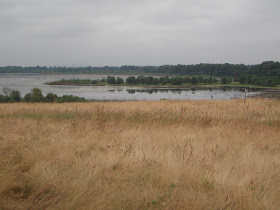These days, as landfills are beginning to fill up, many cities are choosing to close them down and convert them into other uses, such as parks or recreation areas. Growing up outside of Chicago, we used to downhill ski at a hill that was a former trash dump that had been seeded over and onto which they made snow each winter. I never gave it much of a second thought.
In Portland we have a closed landfill that has been converted into a wildlife refuge (see picture above!). The refuge is closed to the public, but I have had the opportunity to go out there several times with my environmental science classes and take a look. And, it is nothing short of amazing. I have seen nesting bald eagles, herons, coyotes, hawks, and all sorts of other wildlife. It is truly a beautiful place.
However, with the conversion from a landfill comes some risks. Methane is produced beneath the ground (from the slow, anaerobic decomposition of the trash). Methane is highly flammable and is also poisonous to plant roots, so methane must be monitored and collected for decades after the landfill is closed. Also, pockets of the landfill can decompose faster and settle, sometimes causing rather dramatic collapses in the landfill surface. And, if the plastic liner covering the landfill gets any rips or tears, leachate (which is a combination of rainwater mixed with everything nasty that is thrown into a landfill) could potentially make it's way into the groundwater.
But, despite these risks, I think landfill conversion is a wonderful idea. What was once an ugly, worthless piece of land is now home to a whole host of birds and animals. It has crated habitat, which is very important in urban settings, and it is beautiful.
However, walking on this closed landfill also makes me think about our future relationship with trash. The amount of trash we create here in the US is astounding. More than 4 pounds of trash per person PER DAY! It all has to go somewhere, and most of that is to a landfill. We can't expect to keep finding new spaces for landfills, even if we do convert them back to habitat at the end. We need to think of better ways to reduce our trash including composting, recycling and reusing. Did you know that the majority of the plastic bottles sold in the US are not recycled?
I have also read about people beginning to invest in landfills, and this idea that they will be the mines of the future. As resources, particularly for energy, begin to dwindle, we may see companies actually mining landfills and burning the waste to create energy. There are already lots of Waste-to-Energy facilities across the globe that turn trash directly into electricity, however, due to the high expense and the air pollution that is created, we don't see too many of them in the US. But, as we enter a future with changing energy inputs, we may start to see these landfills as a resource instead of a burden.
Where does your trash go? Do you live by any landfills that have been closed and converted to other uses?


No comments:
Post a Comment